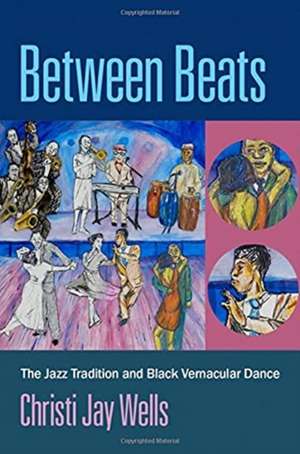Between Beats: The Jazz Tradition and Black Vernacular Dance
Autor Christi Jay Wellsen Limba Engleză Paperback – 29 sep 2021
Preț: 186.35 lei
Preț vechi: 203.92 lei
-9% Nou
Puncte Express: 280
Preț estimativ în valută:
35.67€ • 36.76$ • 30.11£
35.67€ • 36.76$ • 30.11£
Carte tipărită la comandă
Livrare economică 20-26 februarie
Preluare comenzi: 021 569.72.76
Specificații
ISBN-13: 9780197559284
ISBN-10: 019755928X
Pagini: 274
Dimensiuni: 155 x 231 x 20 mm
Greutate: 0.41 kg
Editura: Oxford University Press
Colecția OUP USA
Locul publicării:New York, United States
ISBN-10: 019755928X
Pagini: 274
Dimensiuni: 155 x 231 x 20 mm
Greutate: 0.41 kg
Editura: Oxford University Press
Colecția OUP USA
Locul publicării:New York, United States
Recenzii
The book represents a massive effort of commitment and research and deserves to find those readers who will appreciate it.
Finally! A compelling account of the movements of jazz across bodies and social circumstances. Crafted with care, and brimming with original archival research, Between Beats demonstrates how social dance operates at the center of concerns including commerce, race, class, white supremacy, nostalgia, and gender. Wells offers an urgent and entirely necessary affirmation of jazz along its unmistakable music-dance continuum.
This creative and inspiring book rethinks jazz history through the collective consciousness of Black vernacular dance. If today jazz is 'America's classical music,' it pushed its way into concert and lecture halls by being distanced from the dance cultures that birthed it. With this remarkable study, Christi Jay Wells gives 'body' to jazz studies through a stunning and accessible critique of jazz historiography, scholarly omissions, and racial ideologies. When the music starts, Between Beats asks jazz studies, 'shall we dance?'
The text richly evokes music and dance in very specific places and times, but common folkways wind their ways through migration, segregation, and integration, both buffeted and nurtured by institutions and industrial structures from Roaring Twenties dance halls to classic Hollywood, to a neighborhood senior center around the turn of the millennium. That Wells juggles that complexity with grace and wit results in a book that is intellectually rewarding and historically evocative, and that makes you want to get up and dance.
Finally! A compelling account of the movements of jazz across bodies and social circumstances. Crafted with care, and brimming with original archival research, Between Beats demonstrates how social dance operates at the center of concerns including commerce, race, class, white supremacy, nostalgia, and gender. Wells offers an urgent and entirely necessary affirmation of jazz along its unmistakable music-dance continuum.
This creative and inspiring book rethinks jazz history through the collective consciousness of Black vernacular dance. If today jazz is 'America's classical music,' it pushed its way into concert and lecture halls by being distanced from the dance cultures that birthed it. With this remarkable study, Christi Jay Wells gives 'body' to jazz studies through a stunning and accessible critique of jazz historiography, scholarly omissions, and racial ideologies. When the music starts, Between Beats asks jazz studies, 'shall we dance?'
The text richly evokes music and dance in very specific places and times, but common folkways wind their ways through migration, segregation, and integration, both buffeted and nurtured by institutions and industrial structures from Roaring Twenties dance halls to classic Hollywood, to a neighborhood senior center around the turn of the millennium. That Wells juggles that complexity with grace and wit results in a book that is intellectually rewarding and historically evocative, and that makes you want to get up and dance.
Notă biografică
Christi Jay Wells is assistant professor of musicology at Arizona State University's School of Music, Dance, and Theatre and affiliate faculty with ASU's Center for the Study of Race and Democracy. They have also been an active practitioner of social blues and jazz dancing for nearly two decades and have given numerous dance workshops and dance history lectures locally, nationally, and internationally. Their research on jazz music in Harlem during the 1920s and 1930s has received the Wiley Housewright Dissertation Award and Irving Lowens Article Award from the Society for American Music.
